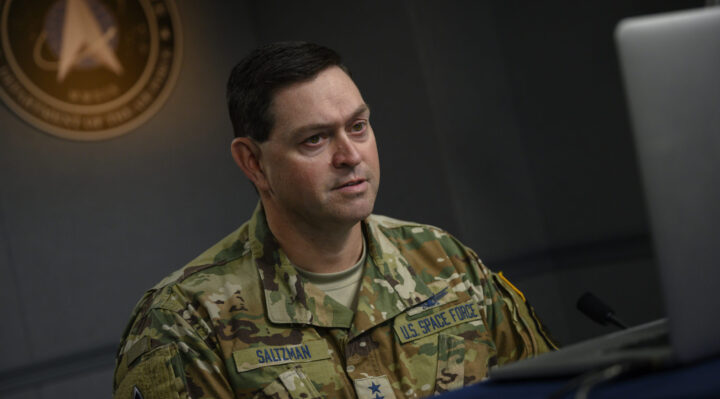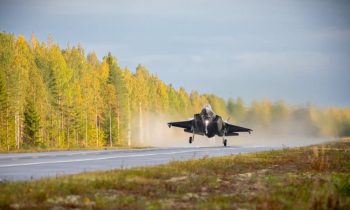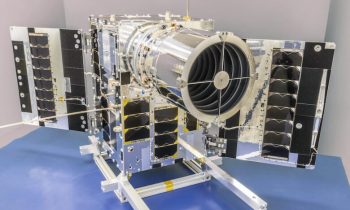Keeping the peace in space will only be achieved by cooperation between nations, according to the head of the US Space Force.
But the pace at which China is developing new space technology and capabilities remains a major threat, admitted Lieutenant General B Chance Saltzman.
Partnerships, information sharing and transparency are key to avoid conflict in space, said Lt General Saltzman, after speaking at an international conference in London on military satellite communications.

He added: “The more resilient we are, it changes the cost/benefit analysis for an adversary or competitor… it really raises the stakes for taking any aggressive action.
“If we can build resilient, common shared access and networks within the space domain that strength will really promote peace.”
And he believed the partnership with the UK Space Command would be “very fruitful over the years to come”.
Lt Gen Saltzman said establishing responsible accepted norms and behaviours in space would need to be done cooperatively across the globe and could not be achieved by one nation alone.
Below is a full rush transcript of the press conference by Lt. Gen. B. Chance Saltzman, Chief Operations Officer, U.S. Space Force.
Lt. Gen. Saltzman: I’m sitting here in London, England, right now. I just gave an address at the Global MilSatCom conference, and so I’d like to just highlight a few of the things that I mentioned during my remarks there. I think it might be particularly interesting to this audience. I was emphasizing the key role that global partners and allies are going to play as we continue to develop resilient architectures.
I was focused on military SatCom, but this easily plays across a host of missions. And by building – leveraging partners, leveraging our allies to build resilient and defensible systems, we have an opportunity to enhance the deterrence for any conflict that may extend into space or even start in space, the idea being that the more resilient we are, it changes that cost-benefit analysis for an adversary or a competitor. If they don’t feel like they can realize the benefits of taking out our systems because we are so resilient, it really raises the stakes for taking any aggressive action. And so we think that that resiliency is going to be key to our successful strategy moving forward.
We want to take advantage of the opportunities that – and partnering with the space-faring nations, not the least of which is because we share common values associated with space and keeping it a safe and effective domain for all users. Establishing responsible norms and behaviors is really a global concern; no one nation can establish those independently. And there’s so much shared capacity that we could leverage, so aligning our efforts and being able to achieve benefits really helps everyone involved. And so partnerships are going to be key.
We think that, quite frankly, if we can build resilient, common, shared accesses and networks through the space domain that that strength really will promote peace in the space domain, and nothing will benefit all users of space like a good, stable environment that’s peaceful in its uses. And so that was one of my main emphasis items to the military SatCom conference, but the criticality of partnerships and allies is at an all-time high and we really want to take advantage of that.
Question: How will the U.S. Space Force work with the UK’s new Space Command? And without a Star Wars-type capability, what will you do practically to counter any threat to U.S./UK space assets?
Lt. Gen. Saltzman: I’ll tell you that one of the prime reasons to coming over to the UK for this trip was to stop by and see our friends in the UK Space Command. I spent all afternoon with them yesterday, the commander, and looking at their operations center, and gaining their vision for how they see progressing the U.S. space – or the UK Space Command and working across the UK enterprise to really enhance space capabilities. It was a tremendous visit, and I’m very excited to have a partner, an ally as close as the UK has been for years, that now has a likeminded organization focused on space, focused on protecting, defending, deterring in space. It’s always nice to be able to reach across to partners who have that shared, common vision, and it’s an organization that’s dedicated to that purpose.
Question: I wanted to follow up on what you just said about cooperation with allies. Specifically on the debris mitigation issue, we are seeing – we are seeing more investments by other countries in technologies and demonstrations to try to figure out ways to remove debris from space, and I was just wondering if the U.S. Space Force is maybe interested in joining some of these international programs or starting new programs with more international participation. It seems like this has to be – this has to be addressed by multiple players in the world to really make a difference. So I was wondering what discussions maybe you had during your trip ?
Lt. Gen. Saltzman: Yes. The complexity of that problem is astounding, and the more I go around and talk to people about debris mitigation and the impact that debris can create in the space environment, the more I learn. I learn something every day about the complexities of the problem set. So first, the Space Force is absolutely committed to ensuring that the space domain is viable and safe now and well into the future, and so we have to address debris mitigation. And I would just say, like you mentioned, it’s going to take really a global effort, a full-scale partnership with many of our allies and partners and likeminded countries to get after this problem set.
It may start with responsible behaviors in space: how we do launch operations, how we do disposal. All of those things that we’re learning how best to be responsible with the space domain, we need to document those things; we need to practice and train and then collect lessons learned. As other nations develop techniques for how to do things better, we need to share that information broadly so that we all understand what the best practices are for preventing debris from ever being on orbit, and then start to think about how do we leverage commercial capabilities or innovative ways to clean up debris that’s already on orbit.
Again, like I said, Sandra, I think this is a very complex problem and it’s going to take everybody pitching in with technology and operational concepts and ideas to really help mitigate that over the long term. And so the Space Force really wants to be a part of that discussion and participate. Thanks.
Question: You mentioned the importance of resilience-based architectures, and we’ve heard a lot lately from the Space Force about the force design work they’re doing through the Space Warfighting Analysis Center. I was curious just from your perspective, what is the significance of that force design process as an operator? And how prominent and how has your team been engaging in the work that they’re doing?
Lt. Gen. Saltzman: Great. Thanks, Courtney. Another very important question as we build the foundation of our Space Force and we start to think about the capabilities that we’re going to need in the foreseeable future. The work that Andrew Cox and the team out at the SWAC – the work that they’re doing is just critical to building the proper foundation. It’s as simple as this: if the operators don’t have the right tools, it’s going to be hard to conduct the right kinds of operations. And so it really does start with making sure that the right kinds of systems are built, developed, deployed, and get into the hands of our operators as efficiently and effectively as possible for us to have the right abilities that we’ll need to conduct operations in the increasingly contested and congested environment.
So to that end, we are – we are fully engaged. The whole operations team is fully engaged with Andrew and his efforts out there. They run a series of – I’ll call them exercises. They’re kind of tabletop simulations. But we want to make sure that our operators are there to make sure that the assumptions that go into the traditional models and simulations, they have good operator, practical inputs so that we don’t draw the wrong conclusions because something doesn’t reflect the way operations really works. He’s really done a nice job of creating these high-fidelity simulations that we can run multiple scenarios on various force designs to see what works and what doesn’t work and what the tradeoffs are operationally.
But in the fine tuning, the techniques and procedures that are employed by the operators also affect how a system will be employed. And so we have to be there side-by-side with them to give them that high-fidelity input on this is how we think the system would be used if it had this capability. That allows a more high-fidelity set of conclusions that comes out of his modeling of SIM*. And so I think we’ve really committed to the fact that if operators aren’t integrated from the early days of analysis in the force design, that the resultant systems that we end up buying just won’t be as good. And so to the most junior operators we have, we are fully integrating to make sure that they do the best work they can to build the kind of systems and the force design that we’ll need. Thanks for asking that, Courtney.
Question: What do you see as the most significant challenge coming from China in the space domain? And how much of an edge does the U.S. currently have?
Lt. Gen. Saltzman: It’s a good two-part question. So let me start with the backend first. I think we are the most capable space-faring nation in terms of the capabilities that we have on orbit. The challenge for us is that we have such great capabilities, it creates such strategic advantage for us that it is a natural target for our competitors. They can see that if they can take some of those capabilities from us that they can shift the tables in terms of that strategic advantage.
And so our strength becomes a potential vulnerability. And the most significant challenge isn’t any one system. It’s really the pace at which they’re developing all their systems. It’s such a broad array of counterspace capabilities that they’re pursuing and high-end technologies that what’s most concerning is just the speed with which they are going from good idea to a full-scale capability that’s being demonstrated on orbit.
And so I think our challenge is going to be matching that pace, making sure that we’re paying attention, keeping good situational awareness for their developments, and try to match the pace with which they’re operationalizing those counterspace capabilities.
Question: Lieutenant General. Frediano Finucci from the Italian TV LA7. As American space forces, do you have a kind of red emergency line with China and Russia in order to prevent accident or in case of need?
Lt. Gen. Saltzman: What a great question. In fact, we’ve had similar conversations recently in my trips just talking about how a coalition would interact in terms of strategic competition and avoid some of the lessons learned from history about miscommunication when there’s such important strategic stakes in play. When I was the deputy CFACC, the deputy commander of Air Force’s Central Command, we had a hotline to the Russians because we were very concerned that a miscommunication with aircraft flying in close proximity in Syria would lead to a problem. And so there was a hotline that we used to make as many of our operations transparent as possible and attempt to avoid those miscommunications. I don’t see any reason why a similar approach couldn’t work for space domain.
What works in one domain, I like to think we should at least make sure that we consider good ideas in one domain in the space domain as we continue to develop our processes and mature our procedures for how to deal with things on orbit. It’s hard to see because we – in space – because we literally can’t use our visual reference points. We have to rely on radar. We have to rely on telescopes. And that creates a level of uncertainty. And I think there’s something to the idea of having a short circuit, if you will, that says, hey, listen, let’s make sure that we at least have a discussion before we draw the wrong conclusions. And so we currently don’t have that capability, but I think the idea merits a full-scale discussion. Thank you.
Question: What are your plans for NATO Space Center at Ramstein Air Base in the coming years in terms of total staffing and in terms of operational value to the U.S. Space Command?
Lt. Gen. Saltzman: Another great question. As part of my trip over here, we stopped by and visited the folks at the NATO Space Center. We’re going to be full participants in that, obviously. Obviously, the U.S. has a very important contribution and commitment to NATO writ large as we develop Space Force capabilities and we integrate those capabilities into European command from a U.S. standpoint and from NATO in a larger standpoint.
The NATO Space Center there at Ramstein is a natural location for us to put capability. And so it’s a very small, nascent organization now. Its focus is primarily on information sharing. We have – we have a presence there at Ramstein in the form of a Space Force component that we’re in the process of developing, and we have close interaction with the current space operations – the NATO Space Center there.
I do expect that it will grow. It’ll just be on the list of things that our small, agile, lean Space Force has to put in its crosschecks and continue to build out. Right now, there are space experts that are currently assigned to both the Space Force and the Air Force inside the NATO Space Center, but I do think that’s an area that we’ll consider for growth as it continues to develop as an organization.
Question: I have two questions, actually. The first one, you talked a little bit about allies – the importance of having allies – but can you say something about why an American Space Force might benefit people here in Norway? And the second question: What is your biggest fear for what an adversary potentially might do in space that will harm American and also, I guess, Norwegian interests?
Lt. Gen. Saltzman: Yeah, that’s a great question. And I did kind of maybe leave it too general when I just said allies and partners. And so I appreciate the clarification. There are plenty of partners, plenty of allies, Norway amongst them. What I would offer to all of our partners is that we think of space as a global domain and that a conflict that extends into space or starts in space, regardless of who the combatants are, is going to be – have very severe negative consequences for anyone who takes advantage of space capabilities. And quite frankly, there’s just not too many countries now that aren’t benefiting dramatically from space capabilities.
And so we feel like if we don’t do our work to protect and defend space capabilities, create resilience in the architecture so that we can deter any adversaries from thinking that they can take advantage of our position in space by attacking, we think that benefits everyone. And so I think the people in Norway and Norway in particular would understand that while we focus on deterrence and keeping the conflict from extending to space that that naturally will benefit their use of space and any space-faring nation’s use of space. And so that’s really why we are focusing on deterrence, because of the global benefit that it creates.
More, you know, maybe tactically, there’s lots of capacity that Norway offers for us in terms of situational awareness and collaboration and information sharing – the ride-share agreements that we’re working on. Those are all very beneficial because we start to share our collective capabilities across a broader spectrum of contributors. And I think that’s all good. That collaboration increases the industrial base. It advances technology at a greater pace, and I think dramatically improves everybody’s capabilities. And so I’m excited about the partnership with Norway and all of the other allies and partners out there. Thanks for asking that.
Question: I was just wondering what the difference is – I mean, there are a countries that you’re cooperating with which have larger space capabilities than others. I mean, I’m – from the European point of view, I was interested, let’s say, for example, how you would be cooperating with France, which has a significant space capability, versus Germany, which has capabilities also? And then also, is there a difference between how the English-speaking countries maybe cooperate in space because of closer relations and various security demands than, let’s say, European countries?
Lt. Gen. Saltzman: Great question. Very complicated. Obviously, that covers a large landscape about how nations work together in any particular domain. So just a couple of thoughts from my particular perspective. I would think about any nation partnering with us, we would be thinking about sharing technologies and lessons learned from a commercial standpoint. The civil side of space does a certain set of operations, but commercial space is really pushing the edge of the envelope in terms of providing capabilities and reaching broader markets. And all of that technology requires launch operations, which lowers cost for everybody as we learn better ways to do those jobs. And so I think there’s technology in the commercial sector that all nations can benefit from as they learn the lessons and expand capabilities.
Maybe in a slightly more military sense, there’s such value added in information sharing, and it’s really an area where we’re really going to push the envelope. In the past, so much has been classified as high-level with regards to space, and we’re really working overtime to make sure that we’re considering appropriately maybe through a new lens of strategic cooperation as well as strategic competition the kinds of information that we need to share with allies and partners in a reciprocal way so that we have the best situational awareness of the space domain to make the operational decisions we need.
And then I can tell you from personal experience that the contribution that we get from our allies and partners when they participate in our wargames and exercises is just phenomenal. Having a different military mindset test your assumptions, ask questions, or see a challenge from a different perspective, it has opened my mind personally, and I’ve seen it across the board. So I know that that’s something that we’re going to continue to pursue, is to work together on the operational front to share lessons learned, share perspectives so that we can collectively underscore the best policies, the best concepts for responsible behaviors in space, and the best ways to share data, share information, and load share the operations that are necessary in the space domain.
Question: I wonder a little bit about the character of the whole thing. Is it more, Lieutenant General, a military – military competition you are looking for or is it, as it would have been 20, 30 years ago, a common task to use space for peaceful purposes, let’s say, around the world? I mean, the second question may be: In your mind, is Russia, is China interested at all in terms of cooperation or do you prefer, as it was said, to counter threats rather than to prevent threats?
Lt. Gen. Saltzman: It’s very insightful and it has strategic implications. It’s what we spend a lot of time and energy trying to sort through, is given the circumstances that we’re in, given the advantages that we enjoy in space, given the threats that we see coming online, what are the intentions of our adversary? What’s the best way to respond?
I will tell you that at least from a U.S. perspective, we believe the end state is a stable, peaceful space domain that everyone can enjoy for the purposes that they see fit. That’s where we get the biggest benefit. That is our end state. That is our goal. The question is: How do we deal with those that may have other designs? And it’s – I think it will depend on the situation. I think it will depend on the other context of what’s going on in the world.
But what I want to do from a military standpoint is to be able to give my leaders options – the broadest possible spectrum of options so that we don’t have to unnecessarily escalate; that we can control situations; that we can diffuse situations; that we can communicate properly to show consequences and benefits if behaviors change – again, all with the purpose of creating a deterrent mindset in the adversary that it just doesn’t make any sense to be provocative, to be aggressive, or certainly to be destructive in the space domain if this is not something that you can achieve an advantage from, and the negative consequences far outweigh any positives you might get. That is our goal because we know that the – that we benefit and most of the world – certainly, probably all of the world – benefits by having that peaceful use for space. And that’s really our goal.
Lt. Gen. Saltzman: Well, no real closing comments. I’ll just say, I really appreciate the opportunity to address an international audience. I don’t always get a chance to do that so it’s kind of exciting to hear the questions. I’ll tell you, I’m very impressed with the quality of the questions. They’re strategic. They’re thinking through broader implications as we develop our Space Force, and it shows a real maturity in the thinking through how does this play out internationally, globally, and in the – what we call the era of great competition. It’s just – those were great questions, and I really appreciate the interaction.



